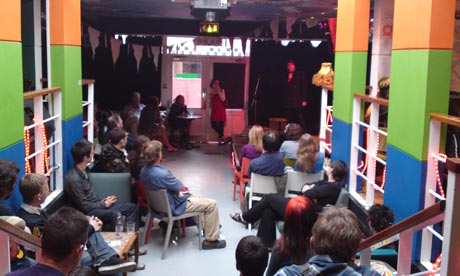
On weekday evenings in starkly lit rooms, people come to turn their hearts out from their sleeves. They come from penthouse apartments and their friends's basements, they come young and old and male and female and in love and in pain, but they come. Sometimes they pay. They take the microphone in turn, and the room falls silent for each individual's story.
This is the reality of spoken word poetry, but it only scratches the surface of how spoken word poems are created.
'Poetry' itself is quite a vague concept; it is generally defined as occupying the space between speech and song, although it can be difficult to distinguish between the three. Some take the form of audiobooks, of monologues, of letters, of confessions or rants.
As a poet myself, my work expresses my identity because I draw on my own experiences. Race, gender, nationality, sexuality – performance poets speak about how they define themselves and about how society defines them, by using new and creative contexts to express themselves. Take Rachel Rostad's poem To J.K. Rowling, from Cho Chang, where the erasure of her racial identity is explored through the medium of Harry Potter; or Melissa May's Dear Ursula, attacking fat-shaming through a letter to Disney's most voluptuous character. Sierra DeMulder's Static is about a school shooting and the first performance poem that ever gave me chills.
In a way, performance poems are like little stories, except their realism is what makes the audience relate to them. Ollie Schminkey's incredibly raw How to Love Your Body in Ten Easy Steps reflects their struggle against transphobia. Everyone has a social justice cause, everyone has experienced or witnessed prejudice in some way, and performance poems can channel this sadness and rage and revolutionary impulse into language that is raw and beautiful.
Don't think, however, that you have to be oppressed or be a minority to be a performance poet: you just have to make people feel something, and be able to think creatively. To The Boys Who May One Day Date My Daughter by Jesse Parent is one of my favourites, as is Dominique Christina's Crushes Suck and Everybody Knows It, because beside being hilarious they're so fantastically normal. Most people have had crushes, most people have or know overprotective parents. How we convert that into poetry is also a matter of identity. Extroverted people may speak faster, use more manic body language, be more theatrical in how they express their viewpoint; introspective people may be more metaphoric and graceful with their language. Writing performance poetry is deeply personal - you can be influenced by other poets, but if you're trying to copy someone else's style you're likely not being true to yourself when writing.
My personal favourite performance poem is OCD by Neil Hilborn. It is a gorgeous, funny and heartbreaking piece about being in love whilst having obsessive-compulsive disorder.
Hilborn takes inspiration from his own past with mental illness in the poem. "I asked her out six times... in thirty seconds. She said yes after the first time, but none of them felt right so I had to keep going..." he says, and we immediately identify with Hilborn; whilst his tale is idiosyncratic, we have all had the feelings of wanting a moment to be perfect, or falling awkwardly in love, or feeling socially awkward.
This is the true magic of slam and performance poetry; it is not only a channelling of other people's identity, but it enriches our own. It makes us question our place in the world and what we want to define us in our lives, and the exposure of new perspectives allows us to come a little closer to realising the full, complex brilliance of human life.
So, try and watch some when you have a few minutes spare. Who knows, you may be inspired!

